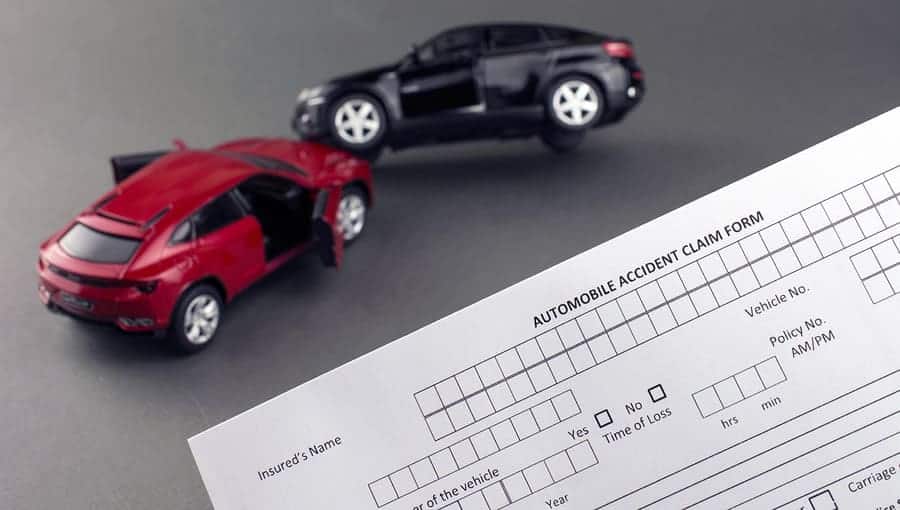If you are hurt in a car accident, you may think that filing a lawsuit and going to court is the best option for you. But in most cases, settling your claim directly with the insurance company will be the best choice. Getting a fair car accident settlement amount for your injures is usually doable without the time, money, and stress of going to court and dealing with a trial.
However, in certain instances filing a lawsuit against the at fault driver is the best course of action. There are some advantages to going to court and letting the jury decide the case, and there may be some serious financial benefits, especially in instances where there are punitive damages (more on that below) and/or if the insurance company is being difficult to negotiate with. Keep reading to learn more about when it makes sense to file a car accident lawsuit instead of trying to settle directly with insurance.

- How Much Is Your Car Accident Settlement Worth?
Find out the maximum compensation you could receive.
- How Much Is My Car Accident Settlement Worth?
What Are Some Benefits to Filing a Car Accident Lawsuit Instead of Settling Directly with Insurance?
While there are definitely additional risks, costs, and time commitments involved in filing a car accident lawsuit, there are also some large potential benefits.
First, auto insurers are notorious for making lowball offers. Which makes perfect sense – the less money they pay out in settlements, the more they keep for themselves and their shareholders. Claims adjusters are well trained and usually quite experienced not at figuring out fair compensation for you, but at figuring out how to get you to accept a low car accident settlement offer so they can pad their bottom line. By filing a car accident lawsuit, you show them that you mean business and are not to be taken lightly. When they see this, insurers often times change their tune and start making much more reasonable settlement offers.
Second is in car accidents with punitive damages involved. Punitive damages refers to additional damages (usually money) awarded to a plaintiff in a car accident or personal injury lawsuit as a way to punish the defendant for bad behavior and/or deter others from committing similar acts.
For example, a car accident whiplash claim might be worth $10k-$20k depending on the severity. However if it happened as a result of road rage when someone intentionally rear ended another car at a stop light, a judge could find that the “road rage” was being so egregious in their actions that they double the amount of lost income, medical bills etc that would normally be awarded in a car accident settlement, and make the amount of a lawsuit payout much larger. Other examples of punitive damages in car accident lawsuits would include:
- Drunk driving accidents
- Texting and driving
- Excessive speeding
Punitive damages are only available if you go to court and file a lawsuit – they are never included in the settlement you’d get directly from insurance. However, if a provable offense occurred and your attorney can convince the insurance company that a valid punitive damage claim could be made should you take the claim to court, and they will often increase the car accident settlement offer.
Trying to Avoid the Car Accident Lawsuit Process
The first part of the car accident lawsuit process is to get copies of all police reports and medical records pertaining to your injuries. You need to have these documents reviewed by an attorney to begin the legal process.
After you have chosen a personal injury attorney to handle your car accident claim, he will start to negotiate with the insurance company to see if a fair settlement is possible. The advantages of settling with the insurance company include:
- You will get compensated faster
- Avoid expensive attorney’s fees
- Not having to go to multiple court appearances
- Avoid getting nothing if the jury decides against you
The main question you and your attorney need to decide is whether you should settle the car accident claim early and get some sort of compensation for your car accident injuries, or risk a trial and perhaps walk away empty handed.
To get negotiations going, your attorney will probably start by sending the insurance company for the liable driver a demand letter. There is a lot of preparation and gathering of evidence that must be done before the demand letter is drafted. If you had medical treatment, you need to have all your medical records in hand. Also, you will need to have your employment records that show your lost time from work.
When you have all these documents, your attorney should draft a concise demand letter. The letter will describe all events about the accident and injury and provide the exact amount of money that was spent on your medical treatments. It also will detail how much work time you lost.
After the demand letter is received, your attorney will enter into settlement talks with the insurance company. But if a deal can’t be reached, filing a lawsuit may be your best or only option.
Car Accident Lawsuit Process: Going to Court
It is usually a better idea to try to settle the accident claim before you go to court. But settlement may not be possible. If the insurance company does not respond to your demand letter, or the offer from the insurance company does not cover your medical costs and lost earnings, you may have to go to court.
Your attorney will file the lawsuit in the appropriate court by filing a legal complaint. Then the complaint will be served on the other driver. Next is discovery, where both sides submit information to each other about their side of the case. Deposition of witnesses also will occur. Then, there is the actual trial. But you can still settle the case at any time up until the jury renders a verdict, and in many cases insurance companies will offer much larger settlements right before a trial starts, or if the direction of the trial doesn’t appear to be going their way.
A free consultation will help you to further understand the benefits and risks associated with filing a car accident lawsuit versus settling directly with the insurance company.


